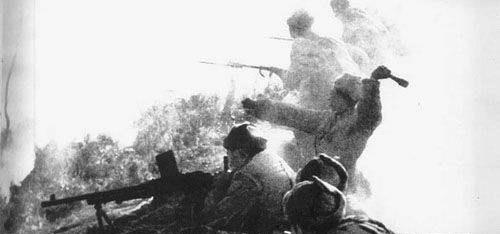After the Chinese Volunteer Army entered the DPRK in October 1950, it launched five consecutive battles, and the volunteers quickly advanced southward with the momentum of destruction and decay, and by April 1951, the United Nations army that had occupied the Northern Dynasty had been driven to the area south of the 38th Parallel. Due to the United Nations army led by the United States, a large number of aircraft were sent to the supply lines of the volunteers to carry out indiscriminate bombardment, causing logistical supply difficulties and causing the front-line combat troops to run out of food. Coupled with the fact that the summer flood season in the DPRK is approaching, and there is a risk of flooding in several major rivers such as the Linjin River, this has caused hundreds of thousands of troops of our volunteer army to fall into a predicament; in addition, the DPRK People's Army has retreated from the front and fled without a fight, causing our volunteer army, which ran out of ammunition and food, to fall into the counter-encirclement of the United States and suffer heavy casualties.

In order to stop the attack of the United Nations army, Peng Dehuai, commander of the Volunteer Command, decided to conduct a decisive battle with the American army in the Tieyuan area for 15 days to buy time for the other units of the Volunteer Army to organize effective second-line defenses. And this blockade task fell on the only well-armed 63rd Army.
The 63rd Army of the Volunteer Army has three divisions of the 187th, 188th and 189th, a direct artillery regiment and a rocket artillery battalion reinforced by the headquarters. Due to the reduction of each division in the early battles, the total strength of the troops was about 24,000-28,000. The commander was Fu Chongbi.
Born in 1916 in Tongjiang County, Sichuan Province, Fu Chongbi joined the Workers' and Peasants' Red Army in 1932, participated in the first, second, and third anti-"encirclement and suppression" struggles in the Sichuan-Shaanxi Soviet Region and the Long March of the Red Army. During the Liberation War, he was the commander of the 10th Brigade of the North China Field Army, the deputy political commissar and director of the Political Department of the 64th Army of the 19th Corps, and other positions.
Fu Chongbi, who was 35 years old at the time, immediately deployed the blockade after receiving the order to block the attack. In accordance with the operational characteristics of the United Nations army, they meticulously designed the defensive tactics of mountain support point defense, reduced the troops into pieces, and organized multiple defense detachments with companies and platoons as units, and deployed them at various key nodes. General Fu Chongbi adopted the method of deep echelon allocation, with fewer troops and more troops, in order to reduce the killing and injury of the volunteer army by the enemy's dense firepower. At the same time, the troops were divided into small groups to entangle with the enemy, and small troops were sent in the evening to harass the enemy. The 187th Division defended the right flank, the 189th Division defended the left flank, and the 188th Division was a reserve.
The U.S. 1st Cavalry Division, the U.S. 25th Division, the British 28th Brigade, and the British 29th Brigade, which participated in the war, totaled more than 50,000 people, with more than 1,450 artillery pieces, more than 220 tanks, and air force support.
The Tieyuan Blockade Battle began on June 1, the enemy first attacked the position of the 187th Division, after the setback, on June 2, the main attack on the position of the 189th Division, the 189th Division relied on the existing positions to resist step by step, resisting until the night of June 3 there was still a regiment and 2 battalions of combat effectiveness, only more than 4500 people remained, at dawn on June 4, the 188th Division of the army reserve took over the position of the 189th Division, and the remaining 2800 men of the 189th Division were reduced to a regiment as a reserve.
The Tieyuan blockade battle was extremely fierce, the enemy army had tanks to open the way, the brothers of the 63rd Army could only fight the enemy with their flesh and blood, and many soldiers fell, and the enemy's artillery fire was like rain constantly throwing at the 63rd Army position, the scene was like being burned by fire, there were corpses everywhere, and some bodies were scorched by artillery fire.
In the face of a powerful enemy, General Fu Chongbi led the soldiers of the 63rd Army to stubbornly defend and fill almost all the troops, including cadres of the organs, correspondents, and even cooks. This earth-shattering battle lasted for 13 days, and after the volunteer army stabilized the defensive line, Fu Chongbi led the 63rd Army to withdraw from the Tieyuan position. After this battle, there were only more than 2,000 people left in the first army, and General Fu Chongbi was also seriously injured and comatose, and was sent to the field hospital.
When General Fu Chongbi woke up and saw Commander-in-Chief Peng Dehuai beside him, the first thing he said was:
"I want soldiers"!
Hearing the general's words, the people present were all in tears!
Commander-in-Chief Peng Dehuai immediately replied, "Give you soldiers, I will make up twenty thousand for you!" ”
After returning to China, General Fu Chongbi entered the Higher Military Academy for further study, was awarded the rank of major general in 1955, and later served as deputy commander of the Beijing Military Region and commander of the Beijing Garrison District, and died on January 17, 2003 at the age of 87.